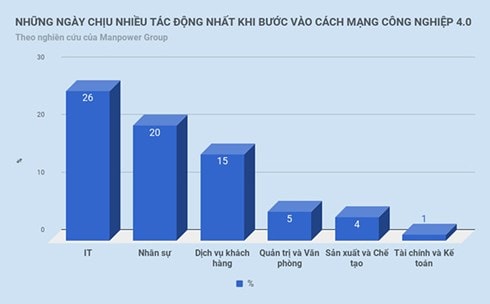Generation born from 1995 onwards faces high risk of unemployment
The Fourth Industrial Revolution will dramatically change the face of the world. Many of the jobs that Generation Z (born between 1995 and 2012) will undertake have yet to appear.
This is the comment made at the workshop Human Resources and Technology for the Digital Age in Vietnam organized by ManpowerGroup in coordination with the Ministry of Labor, War Invalids and Social Affairs, and Viettel Military Telecommunications Group on the morning of November 14.
Industry 4.0 creates opportunities and challenges
Currently, the 4.0 industrial revolution is taking place strongly in America, Europe and part of Asia. Experts have also predicted that the downside of the 4.0 industrial revolution is that it can divide the labor market, because when automation replaces manual labor in the economy, when robots replace humans in many fields, millions of workers in the world may fall into unemployment. With the movement of this revolution, in the next 15 years the world will have a new look, requiring businesses to change.
 |
| The 4.0 industrial revolution is both an opportunity and a challenge. Illustrative photo |
From another perspective, Mr. Simon Matthews, General Director in Vietnam of the multinational human resource consulting corporation ManpowerGroup, believes that, besides challenges, the 4.0 industrial revolution will open up new opportunities for the world in general and Vietnam in particular.
According to Mr. Simon Matthews, creativity, intelligence and cognitive flexibility are skills that highlight human potential and help them remain an important workforce, rather than being replaced by robots.
Automation can hardly replace highly skilled human resources in the 4.0 industrial revolution. Automation also cannot replace humans in terms of decision making and cognitive flexibility. Therefore, human resources in the digital age must possess skills that machines cannot have.
In addition, in the strong transformation of humanity to the industrial revolution 4.0, many new professions will also be created. This expert said that, according to estimates, up to 65% of the jobs that Generation Z (born 1995-2012) will undertake have not yet appeared.
 |
| Mr. Simon Matthews, General Director in Vietnam of the multinational human resources consulting corporation ManpowerGroup. |
“Change does not wait for us, all business leaders, educators and governments must upskill and retrain their human resources so that everyone can benefit from the Industrial Revolution 4.0”, Mr. Simon Matthews emphasized.
Skills will become the new currency
According to ManpowerGroup's survey in Southeast Asia, the talent shortage situation 2016/2017, 2016 is considered the most difficult year for recruitment in the past 11 years.
In Vietnam, there is a serious shortage of senior management personnel, partly due to the brain drain, with the number of Vietnamese working abroad in 2015 increasing by 8% compared to 2014.
The sectors with the greatest shortage of human resources are IT, manufacturing, engineering, and retail. Of these, the manufacturing sector accounts for the highest proportion of human resource recruitment needs, as Japanese and Korean companies have invested heavily in Vietnam in recent years.
 |
Next, sales and marketing positions also account for a high proportion of recruitment needs. Recruiters say that sales positions are relatively difficult to recruit because they require employees to have both sales skills and technical knowledge.
Meanwhile, the number of bachelors graduating each year is not small. Talking about this issue, Mr. Simon Matthews said that the rate of unskilled workers in the whole society currently accounts for 81.4% of the total labor force.
The workforce lacks necessary skills such as teamwork, problem solving, IT skills, foreign languages, low professional ethics, lack of responsibility and slow adaptation to new environments. The capacity for innovation and scientific and technological creativity of highly qualified workers is still weak.
This expert is concerned that this is an alarming problem regarding the quality of human resources that cannot meet the requirements of industrialization, modernization and international integration.
Therefore, to turn challenges into opportunities, “People will need new skills to find job opportunities, even for jobs that do not yet exist. Skills will also become the new currency in the talent era,” the General Director of ManpowerGroup Vietnam emphasized.
According to information from the World Economic Forum, by 2020, more than a third of the core skills required by most jobs will include skills that are not valued by jobs today.
According to ManpowerGroup, this year, the necessary skills for human resources to be ready to participate in the 4.0 industrial revolution will be complex problem-solving skills, critical thinking, creativity, human resource management, coordination with colleagues, emotional intelligence (EI), assessment and decision-making, service orientation, negotiation, and cognitive flexibility.
Agreeing with the above opinion, Mr. Dinh Duc Hung, Chief Engineer of SmartCity solution, Viettel Telecom, emphasized 4 issues that people need to prepare and deal with in the 4.0 industrial revolution including: Connecting infrastructure, mastering new technology, applying information technology in industries and human resources.
In particular, Mr. Hung emphasized the issue of human resources. This is the most worrying thing for Vietnam to shift to the industrial revolution 4.0. Vietnam currently has over 90 million people, including many groups such as workers, farmers, civil servants, people working in the service sector, etc.
Changing the labor structure is difficult, improving the skills and abilities of workers is even more difficult. To adapt to this, workers have no choice but to study and self-study to improve their own qualifications./.
According to VOV
| RELATED NEWS |
|---|

.jpg)
